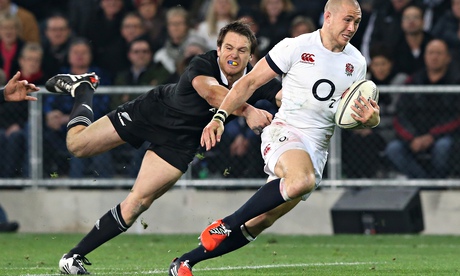
Given the universal expansion of the time the ball is in play, the notion remains within the bounds of possibility that if or when England meet New Zealand at the World Cup they will both embark on a caper as engaging as this one in Dunedin. On the other hand, for all its haka and huff and puff, this did not replicate a late-stage knockout occasion, not even with the All Blacks taking an unassailable lead in the three-Test series. It looked like a decent middle match, a warm-up for the home team and a warm-down for the visitors. No harm was done.
It was certainly brave of England to take on the most adventurous team in the business with a running version of their own. There were some neat pieces of cheek and some dainty bits of footwork – from Manu Tuilagi for one – deep in their own 22. If the breakout was on, even from distance, England were prepared to go for it. Going forward in this way, as a complement to the more familiar driving maul, gave England a real sense of balance in attack.
If only other familiar elements of their game had been as polished they could have stretched their lead. After Joe Launchbury’s charge down of Aaron Smith’s box kick, for example, England should have nailed the try. They eventually won a penalty and it all came not too long before Marland Yarde’s try, but there was a golden opportunity to cross directly from the second-row’s intervention. The reminder issued by Stuart Lancaster about finishing should have been ringing in their ears.
Instead, the ball came the way of the estimable Chris Robshaw. On this occasion, he was a solitary figure out wide, and the decision to ship the ball the captain’s way was a mistake. Danny Care was not at his most precise throughout the game, mistiming a pair of kicks and taking his eye off the ball at the back of a couple of mauls.
At the same time, Richie McCaw was having his own wrestle with the gremlins. Care held the All Black captain up long enough with his delayed pass for the Yarde try that McCaw could not drive his left shoulder into the tackle. Yarde should scour the pictures of the game and have framed the sight of McCaw on the ground while the winger scores. A rare snap.
It somehow – with all due respect to Yarde’s fine finish – summed up the lack of bite. Any World Cup showdown will presumably have very few missed tackles – at least for as long as there is air left in the players’ lungs. Here, when the All Blacks took the pace up another gear in the second half, England found the running game more difficult.
Mike Brown had a fabulous Six Nations for his country and a fine season for Harlequins. But when it came to changing the course of this game, it was his opposite number who stood out. Brown has not slipped past the first defender in New Zealand as easily as he does at home, but Ben Smith – one of three so surnamed in the All Black starting team – ran angles that invariably took him through the defence. Conrad (of the Smiths) was as effective as ever in reading the lines of his full-back.
It was all in the passing. England, in this period of accelerated tempo, still tried to deliver their passes out of the tackle. But there comes a moment when the brain has to say no, and the hands have to obey the counter‑command. Billy Twelvetrees could not stop himself letting the ball go. It led to Julian Savea’s surge and pass to Smith B for the try that initiated New Zealand’s comeback.
The pass by Jerome Kaino to Savea for the next try was even better. Ma’a Nonu had just thrown one that might have entered the category of “Not now, Ma’a,” had the bounce been kinder to England, but Kaino turned the situation from fraught to fabulous. He scooped up the ball, took contact and flicked the ball one-handed to Savea – three executions for the brain to manage in the blink of an eye.
It was this ability to process the data at full speed that won the game. At the end of the third quarter it seemed certain the All Blacks were going to score a lot of points. They had that cruel glint in their eye, the one that suggests they were about to enjoy finishing the job in style.
It didn’t happen. That England survived the 10-minute spell when Owen Farrell was in the bin and then scored two tries of their own revealed admirable strength of mind on their side. To refuse to yield when the game has gone and your body is screaming for a rest shows that England are in a good place.
This may have lacked the ferocity and strain of a World Cup showdown, but to rally in New Zealand, reduce the losing margin to a single point and have the breath to say how disappointed they were to have lost the game and the series gave this encounter real value. If the brain can cope with all that, then it should be able to sort out saying no to the risky pass and yes to keeping an eye on the ball.

